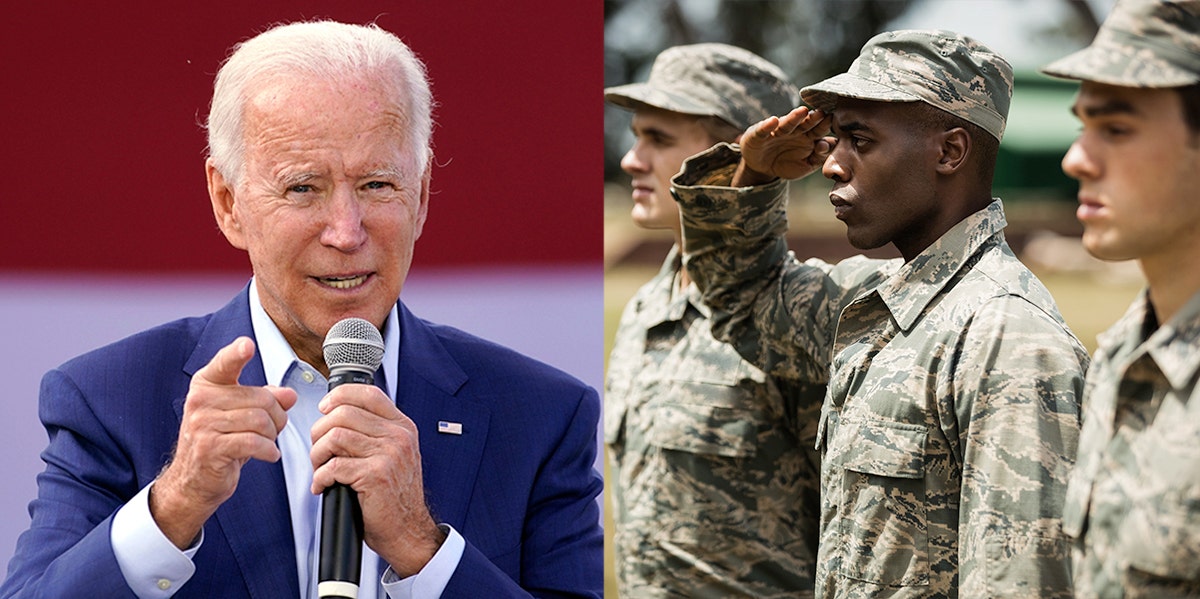How Veterans Discharged Under ‘Don’t Ask, Don’t Tell’ Are Finally Getting Justice For Anti-LGBTQ Discrimination
It's about time!
 Naresh777 & wavebreakmedia / Shutterstock
Naresh777 & wavebreakmedia / Shutterstock On the 10th anniversary for the repeal of the United States military policy “Don’t Ask, Don’t Tell,” the Department of Veteran Affairs announced plans for veterans who were victims of the policy to finally receive full benefits.
The highly controversial policy banned tens of thousands of veterans who were openly a part of the LGBTQ community from serving in the military.
LGBTQ veterans are finally getting justice after the 'Don't Ask, Don't Tell' policy.
The announcement came on Monday, and will apply to all of the veterans who were given “other than honorable discharges” and were forced to leave the service due to their sexual orientation, gender identity, or HIV status.
RELATED: Military Officials Say Active-Duty Suicide Rates Have Increased 20 Percent Since Start Of Pandemic: Report
“At VA, we continuously work not only to meet the needs of LGBTQ+ Veterans, but also to address ongoing issues that LGBTQ+ Veterans face as a result of the military's decades-long official policy of homophobia and transphobia," wrote Kayla Williams, an assistant secretary for public affairs in the department's Office of Public and Intergovernmental Affairs.
Under the newly-issued policy, cases will be reviewed for LGBTQ veterans, reinstating benefits unless there is a criminal history. The assistance will range from disability benefits, college money, loans, to mental health services.
"The repeal of Don't Ask, Don't Tell, which formally barred gay, lesbian, and bisexual service members from openly serving, helped move our nation closer to its foundational promise of equality, dignity, and opportunity for all," President Biden said in a statement.
"It was the right thing to do. And, it showed once again that America is at its best when we lead not by the example of our power, but by the power of our example."
President Bill Clinton first put the “Don’t Ask, Don’t Tell” policy on February 28, 1994, preventing openly gay, lesbian, and bisexual military members from enlisting and serving.
It wasn’t until 2010, when President Obama signed the repeal of the policy into law, which would then go into effect on September 20, 2011.
Before the repeal, service members had to live in secret, keeping their sexualities to themselves and having to present themselves as straight. Many people had to learn to come back out of the closet once the “Don’t Ask, Don’t Tell Policy” was eradicated.
Over the last 70 years, an estimated 100,000 military veterans either left or were kicked out of the service and other branches of the U.S. military for their sexual orientation.
When it came to pushing for service members discharged because of their sexuality to receive VA benefits, Lindsay Church was at the front of the line.
Church is a Navy Veteran who co-founded Minority Veterans of America, a nonprofit organization created to focus on belonging and inequity for underrepresented veterans.
In an interview with NPR, Church made it clear that overturning the policy hadn’t been enough. “Even to overturn the policy wasn't enough to undo the harm and the damage that was done. And so this moment is life-changing for so many people."
It’s hard to imagine the trauma that LGTBQ veterans faced while trying to keep their own sexual identities hidden for fear of being kicked out in a way that made their sexualities seem like a crime.
It has always been about equal rights for everyone, and now the VA has committed to making sure that plan is being seen through for all veterans, including the ones who were harmfully excluded.
Nia Tipton is a writer living in Brooklyn. She covers pop culture, social justice issues, and trending topics. Follow her on Instagram.
